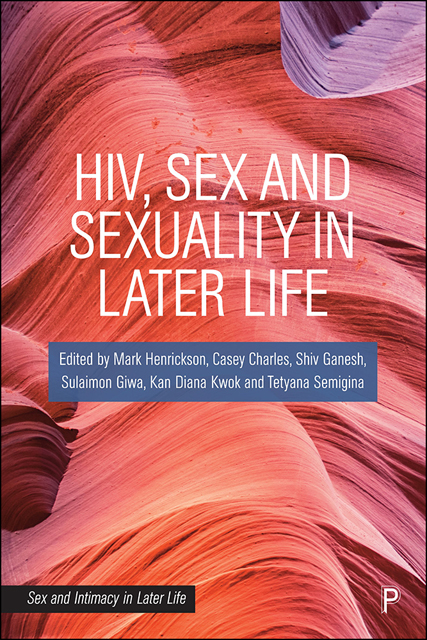Afterword
Published online by Cambridge University Press: 16 June 2023
Summary
HIV is not over.
Venerable (how they would hate that word!) AIDS organisations such as Gay Men’s Health Crisis (GMHC) in New York and the AIDS Action Committee of Boston began reminding us as long ago as 1989 that despite astonishing advances in treatments, HIV is not over. I have a faded refrigerator magnet from GMHC that reminds me of those words every day. The World Health Organization (2021) continues to remind the world that HIV and HIV stigma are ongoing global realities.
The lives of people living with HIV are not over. This is equally important to remember.
The contributors to this book have shared stories of people from all over the world who are living with HIV in what they consider later life (however old in years they may be), people still coping with the stigmas associated with both HIV and with later life. Antiretroviral treatments have worked their medical magic in places where they are readily accessible, and people with HIV are living their lives with less physical suffering, with less risk of early death. People with HIV are no longer ‘standing in the fire’, as one African research participant told me years ago (Fouché et al, 2011). That is an astonishing and wonderful thing. But the stories we have heard in this volume are not only, or even mostly, about people living with HIV; they are also about people living with the stigma associated with HIV, as though their lives should be over. Women in Switzerland, Ukraine and the United Kingdom who have withdrawn from their communities and who avoid emotional and sexual relationships; gay men in the United Kingdom and Aotearoa New Zealand who continue to marginalise older gay men; gay men, women, trans women and hijra living with HIV; Kenyans and South Asians living with HIV and marginalised identities – these and others who no longer need others to stigmatise them, because they have learned so well to stigmatise themselves. People living with HIV find support in other people living with HIV, and they have drawn together to protect each other against the stigma and malice of a stigmatising world. It is only the few courageous voices who risk telling their stories.
- Type
- Chapter
- Information
- HIV, Sex and Sexuality in Later Life , pp. 191 - 193Publisher: Bristol University PressPrint publication year: 2022

